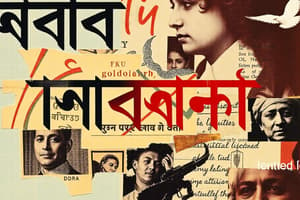Podcast
Questions and Answers
What type of writing system does the Bengali script represent?
What type of writing system does the Bengali script represent?
- An alphabet
- A logographic system
- An abjad
- An abugida (correct)
What is one of the characteristics of Bengali grammar?
What is one of the characteristics of Bengali grammar?
- It relies solely on word order for grammatical structure.
- It has no distinct grammatical genders.
- It uses a system of affixes to denote grammatical functions. (correct)
- It is exclusively analytic in nature.
Which of the following best describes the Bengali literary tradition?
Which of the following best describes the Bengali literary tradition?
- It has no historical significance.
- It includes a vast range of genres including classical literature and modern novels. (correct)
- It focuses mainly on non-fiction writings.
- It is limited to poetry and religious texts.
What role does the Bengali script play within Bengali culture?
What role does the Bengali script play within Bengali culture?
How does dialect variation in Bengali manifest?
How does dialect variation in Bengali manifest?
Which of the following describes the verb conjugation system in Bengali?
Which of the following describes the verb conjugation system in Bengali?
What is a notable feature of the Bengali script compared to Devanagari?
What is a notable feature of the Bengali script compared to Devanagari?
What types of grammatical cases are present in Bengali nouns?
What types of grammatical cases are present in Bengali nouns?
Flashcards
Bengali Language
Bengali Language
An Indo-Aryan language primarily spoken in Bangladesh and parts of India.
Bengali Script
Bengali Script
A writing system used to write Bengali, based on Brahmi script.
Abugida writing system
Abugida writing system
A writing system where vowels are inherent to consonants, marked with diacritics.
Bengali Grammar (Synthetic)
Bengali Grammar (Synthetic)
Signup and view all the flashcards
Grammatical Genders (Bengali)
Grammatical Genders (Bengali)
Signup and view all the flashcards
Bengali Dialects
Bengali Dialects
Signup and view all the flashcards
Rich Literary Tradition (Bengali)
Rich Literary Tradition (Bengali)
Signup and view all the flashcards
Bengali Literary Figures
Bengali Literary Figures
Signup and view all the flashcards
Study Notes
Bengali Language Overview
- Bengali is an Indo-Aryan language spoken primarily in Bangladesh and the Indian states of West Bengal, Tripura, and Assam.
- It's the 20th most spoken language in the world, with a significant number of speakers in addition to its native regions.
- The language has a rich literary tradition, evident in its vast body of poetry, prose, and other forms of expression.
- It's written using the Bengali script, a variant of the Brahmi script, which differs from Devanagari script.
Bengali Script
- The Bengali script is an abugida, a writing system where vowels are inherent to consonants, with diacritics used to indicate variations.
- It's a significant part of Bengali culture and heritage, playing a crucial role in preserving the language and its literature.
- Several variations and styles exist within the script, reflecting regional and historical influences.
- The script's structure makes its writing and reading distinctly different from other Indo-European scripts.
Bengali Grammar
- Bengali is a synthetic language, with grammatical functions mostly indicated through affixes added to words.
- It has distinct grammatical genders (masculine, feminine, and neuter), playing a key role in sentence structure and verb conjugation.
- The verb conjugation system is complex in comparison to some other languages, with changes in verb forms depending on the subject and tense.
- Cases, similar to aspects present in other languages, are used in Bengali to demonstrate the function of words in a sentence.
- Nouns have specific forms to indicate grammatical case, such as nominative, accusative, dative, and so on.
Dialects of Bengali
- Different dialects of Bengali exist across the regions where it's spoken.
- These dialects exhibit variations in pronunciation, vocabulary, and grammatical structure.
- These differences often reflect the linguistic influences and cultural contexts of the areas.
Literary Tradition
- Bengali has a long and rich literary tradition, deeply intertwined with the cultural and historical development of the region.
- Notable figures and works of Bengali literature include poets, writers, and playwrights who have significantly contributed to the language and its evolution.
- Classical literature, novels, and other forms are vital to understanding the evolution of the language and the thoughts of the Bengali people over time.
Bengali in Modern Usage
- Today, Bengali plays a crucial role in the daily lives of its speakers.
- It remains a vital language for communication, education, and cultural expression.
- Its role in literature, arts, and media remains relevant.
- Bengali is used in various contexts, including government institutions and the media.
Studying That Suits You
Use AI to generate personalized quizzes and flashcards to suit your learning preferences.




